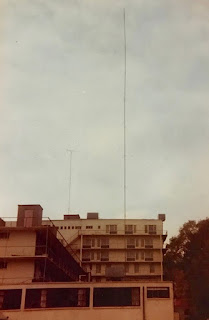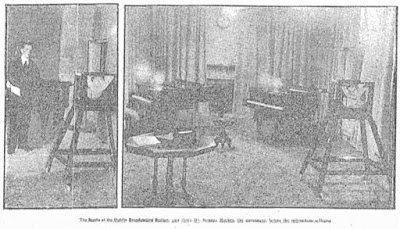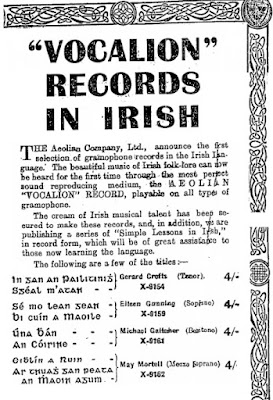As an amateur wordsmith
finding words to write an article should be easy but when remembering the full
and fascinating life of Donald Moore, most words seem inadequate. The easiest way
to convey what this legend was, is to tell you that he was to a generation known
as Doctor Don, not that he ever took the Hippocratic oath, but was a Doctor of
Words on the Radio. Dr. Don was a larger than life character, that did more to
promote the breaking of the RTE’s broadcasting monopoly than anyone else. We
owe him a huge debt of thanks even RTE, as his antics woke them from their
slumber.
Dublin born Don, was a
pirate radio pioneer, an extrovert who used his eccentric personality to
promote a new genre of radio broadcasting. While the tsunami of change was later
led by Chris Cary, Robbie Robinson and the O’Connor family to name a small few,
Don was the rock that was thrown into the lake of banality that was Irish radio
in the late 60’s and early 70’s. It was his passion that sent out ripples of
change across Ireland.
From his early days with
Radio Dublin, his self-promotion to garner publicity for this new alternative radio
landscape was inescapable from both listener and reader. From self-immolation threats
outside the GPO at a Radio Dublin protest, to nestling his head in the bra and
chest of a model, the zany antics worked a treat as many press column inches
featured the new radio buccaneering with Don leading the charge from the front.
With his lovely wife
Debbie, they gave over part of their home in Killala Road, Cabra to house initially
Westside Radio, then Radio Dublin and later Alternative Radio Dublin, as the
game of cat and mouse with the authorities attempting to raid and close the
pirates gathered pace. No stranger to the courts on charges of illegal
broadcasting, Don never let something like the threat of jail slow him down.
According to ‘That’sIreland’,
‘In
1975, Doctor Don Moore arrived. He was a young fast-talking, long-haired
electrician, and he relaunched Radio Dublin, broadcasting music at weekends
from his home in Cabra. When he needed someone to fix his transmitter, Don
turned to the raspy-voiced, early-middle-aged owner of an electrical repair
shop, Eamon ‘the Captain’ Cooke.
The
Doctor and the Captain soon split, after a row about how the station should be
run, and maybe also about the profits from selling t-shirts. For a while, in
traditional Irish style, the pair ran rival Radio Dublins from their respective
homes.
Don
then joined forces with a rival pirate outfit, the imaginatively-named
Alternative Radio Dublin, or A.R.D., which had been started the previous year
in a garden shed in Drimnagh.’
Those run-ins included
car ramming’s, physical intimidation and threats. But in the end Don’s ARD
became THE station in Dublin, required listening, popular and
occasionally profitable. ARD was a game changer and when radio industry professionals
like Robbie Robinson (RIP) and Chris Cary (RIP) arrived in Ireland, they saw that
the loopholes exploited by Moore’s ARD provided a template for their own
stations.
In the pirate TV studios of Channel D in 1981
On air, his shows were to
put it mildly, organised chaos. Perhaps with hindsight his zany antics are not
politically correct but Don wouldn’t let something like that stand in his way. When
the hobby stations of the mid-seventies began to become emboldened, Don found a
businessman Bernard Llewellyn, owner of Anya TV, to invest in Alternative Radio
Dublin. Don oversaw occasional, amateur hobby pirate radio move to a scheduled,
tightly run, proper alterative radio. So many names in Irish entertainment can
trace the origins of their success to that Georgian House on Mountjoy Square.
From Mrs Brown, Brendan O’Carroll to Robbie Irwin, Ian Dempsey, Aidan Cooney
and the late Gerry Ryan, they learned their skills firstly at . His access to
publicity was legendary as newspapers, entertainment and music magazines and
fanzines courted his story, Larger than life tales made his a larger than life
character. He even found time to film advertisements for the short lived pirate
television station Channel D, promoting a furniture store with of course the obligatory
Dr. Don accessories, a scantily clad woman and lots of double entendres.

The former home of Moore on Killala Road
As the Super pirates hit
the airwaves with Nova, ERI and WLR, Don’s perhaps less than professionalism
was side-lined but while he didn’t travel that road, he certainly drew the map.
He was a disruptor, a rogue and an amazing raconteur. He reinvented himself yet
again and began to operate a successful faith healing service that managed to
help many in a way only Don could. His life experiences were those of many who
had to overcome troubles.
Despite his enormous contribution
to Irish radio history, his real pride was in his daughter Lacy. A talented actress
who has appeared in Emmerdale, the Fall and numerous other productions, each time
she was due on TV or away filming, a text from Don would inform me and his
pride shone through brighter than any solar light. He rang me not so long ago
to tell me that his brother had died in London and because of restrictions he was
unable to travel but he spoke with such sensitivity to me that Lacy had
attended to represent the Dublin side of the Moore family.
He is fondly remembered by
all those who found their feet in pirate radio and later legit radio. He is
fondly remembered by those who met him and was always dressed to impress. Personally,
since a pirate radio gathering organised by pirate.ie in October 2018, I have
met and spoken to Don on countless occasions, he passed on untold stories, memorabilia
as donations to The Irish Pirate Radio Archive at DCU and we just chatted about
life, loves and the craic. We are blessed that there are so many interviews with
Don both in print and in person, that our memories of his will not diminish,
that he will forever be in our hearts and his family in our prayers.
Donald (Dr. Don) Moore a deserved
recipient of any Irish Radio Hall of Fame Award,
Ar dheis Dé go raibh a anam
This is the station
history of ARD from my book ‘A Century of Irish Radio 1900-2000’ available on
Amazon.
Alternative
Radio Dublin - 257mMW
As the name suggests the station positioned itself as a breakaway from
Eamon Cooke’s Radio Dublin. The station was first launched in July 1976 broadcasting
from a garden shed in Drimnagh on 217mMW. The station had been launched by Davitt
Kelly, Mark Storey and Declan Meehan who were joined in 1977 by Don Moore
(known on air as Doctor Don). The station was moved to Don Moore’s home on
Kilalla Road Cabra where it was raided and briefly closed on September 15th
1976. Just after midnight Post and Telegraph officials backed up by the Gardai raided
the station. The authorities were becoming increasingly concerned that the station
had been expanding its broadcasting hours but even after the raid the station remained
broadcasting only on Sunday afternoons. The charges against Moore were dropped
in the subsequent court case in June 1977 when a witness Eamon Cooke described as
a ‘radio officer’ said that the equipment produced in court could have been
used for purposes other than broadcasting. When the Post and Telegraphs engineer
Peter Moloney was recalled to the witness box he had to agree with Cooke’s
observation.
Moore had initially been a partner with Eamon Cooke in Radio Dublin
until the men violently fell out. Moore offered the ARD a home which was broadcasting
on low power every weekend with a quality of programmes that made them stand out
against the other hobby pirate stations including Radio Dublin.
In 1978 Moore
met with a television retail storeowner Bernard Llewellyn while selling advertising.
After several meetings Llewellyn bought into the station at Moore’s request without any consultation with
the other owners. One by one they left the station until only Moore and
Llewellyn were left. In January the station moved out of Moore’s home into a
Georgian building on Belvedere Place and with that move came a frequency change
from 217m to 257m.

On January 28th 1978, ARD announced ambitious plans to cover
the Minister for Finance’s Budget Day speech on February 1st with a
reporter at Dáil Eireann, Howard Kinlay and a guest panel in studio to discuss the
Budget. Howard Kinlay was a unique broadcaster in pirate radio circles as he was
one of the few who had worked for RTE before moving onto pirate radio. The former
President of the University Students of Ireland organisation was from the late 1960’s
a member of staff at Radio Eireann’s radio headquarters in the GPO. As a presenter
in 1969 along with Sean MacReamoinn he presented a special programme on the 50th
anniversary of the meeting of the First Dáil. He garnered newspaper headlines
in 1972 as the producer on the ‘Opinion’ programme when planned interviews with
members of Sinn Fein were pulled by RTE in fear of contravening Section 31 of the
Broadcasting Act. He became well known in media circles as both the editor and occasional
producer of the popular radio show ‘Here and Now’. In 1973 Howard decided to
leave the station and take up a position with the Irish Management Institute. He
a 1973 Irish Press article Howard said that
‘a lack
of resourses one is forced to work to a lower standard. One is forced to put a
programme out on air before it was ready to go on air’
In late 1977 as ARD continued to expand Howard joined the pirate station.
Mountjoy Square
In March 1978 at a press conference at ARD headquarters it was announced
that Howard[1] was
taking on the position as Director of Programming, On January 31st
while DJ Jason Maine (real name Pat Long) was on air Gardai and officials from
the Department of Posts and Telegraphs raided and closed the station. The station
managed to get itself back on the air but the transmitter was of poor quality. In
May 1978 was reported by the Irish Examiner,
‘A raid by Gardai
on the pirate radio station, Alternative Radio Dublin, was
described in Dublin District Court yesterday when the owner Bernard Llewellyn of
76, Walnut Rise, Dublin, was fined a total of £25 for having in his possession
a radio frequency power amplifier for a radio frequency oscillator
without a licence, on January 11. The Court ordered the forfeiture of the apparatus.
Detective Sergeant Bernard McLoughlin,
Investigation Branch of the Department, told District Justice Seamus Mahon that
he was involved in the investigation of illegal wireless telegraphy apparatus
by pirate radio stations. On January 31 he visited 43 Belvedere Place,
headquarters of A.R.D. having with him a search warrant. He was accompanied by
other Gardai and by members of the Department's engineering branch and in a
small room on a landing ne saw wireless telegraphy apparatus actually in operation.
Some of the party
heard the announcement being made: "Station A.R.D. is now being closed
down due to a raid by the Department of Posts and Telegraphs".
Following
a visit by Llewellyn to Capital Radio in London to assess their success, a new
transmitter was purchased and a new format introduced. A new degree of professionalism
previously absent from the Dublin
pirate scene was created and the station went from being a hobby operation to
broadcasting seven days a week with a full schedule. On the back of programmes
like Jason Maine’s ‘Drivetime’ and Paul Vincent’s ‘Pyjamarama’ shows the station
became the most popular in Dublin
taking the younger audience away from RTE.
On January 7th 1979 two DJ’s Conor Downes and John Hassett
were injured in an explosion at the station initially blamed on a ‘experimentation
with laboratory chemicals’. The TV and stage comedian and creator of ‘Mrs Brown’,
Brendan O’Carroll was in the station at the time of the blast.
D.J. "Uncle
Bren the kiddies friend" (Brendan O'Carroll) said: "At 9.30 I was just
putting on a record when I heard this almighty bang. It threw me out of my
chair. I thought it was more car bombing. I ran into an adjoining office and
lay on the ground. Later I ran down stairs to see what had happened and there
was blood on the steps of ARD headquarters. There were five fire brigades and several
police cars and hundreds people around.
Mrs. Brown (Brendan O'Carroll AKA Uncle Bren)
In July 1979 ARD was put off the air for four hours when RTE obtained an
injunction to stop the station broadcasting for a set period as RTE Radio was
conducting a live outside broadcast from the nearby St Francis Xavier Hall featuring
the RTE Symphony Orchestra and featured international singer Marian Montgomery.
RTE claimed that ARD’s transmitter was interfering with their OB link to Montrose
and the injunction was granted with ARD ceasing transmissions for the four hours.
After almost two years at the top of the rating, Llewellyn decided to close
the station with the intention of applying for one of the new Independent radio
licences that were speculated to be on their way. The station struggled when
some of its most popular on air talent was taken by RTE’s new national pop
station RTE Radio 2. ARD closed down on December 31st 1979 but it
would be another ten years before independent commercial radio was launched in
Ireland.
Don Moore had originally studied to be an electrician but became involved
in pirate radio in 1975 when he launched Westside Radio. Westside had been a
shortwave station. Moore would later leave the radio
business and became a faith healer based in Drogheda, County Louth. His website describes him as an ‘International
Psychic Healer, Mind, Body & Spirit Therapist’.
The ARD (Radio 257) aerial above the Crofton Airport Hotel, Whitehall
When Llewellyn decided to close ARD, he sold the station to a group of
the stations DJ’s including Dave Cunningham who in an interview in 1991 with
Denis Murray said they had paid just under £5,000 for the station but were
unable to use the moniker ARD and so it was renamed Radio 257. They moved location
to the upper floors of the Crofton Airport Hotel and would later revert to its
original name ARD. The station moved yet again to be based above the Walton’s Music
South on Frederick Street although technical issues dogged the station. The
arrival of the formatted super pirates of Sunshine and Nova in the early eighties
fatally damaged ARD both in terms of listenership and advertising and costing
about £600 per week to run ARD disappeared from the airwaves. In the same interview
in 1991, Cunningham revealed that at a breakfast in the Berkley Court Hotel, he
met with Robbie Robinson, Chris Cary, Brian McKenzie and Phil Solomons who
instead of setting up a new Dublin pirate radio stations from scratch offered
to buy ARD for £33,000 but Cunningham turned it down and Robinson and Cary went
ahead with plans to launch Sunshine Radio.

For further reading see
































